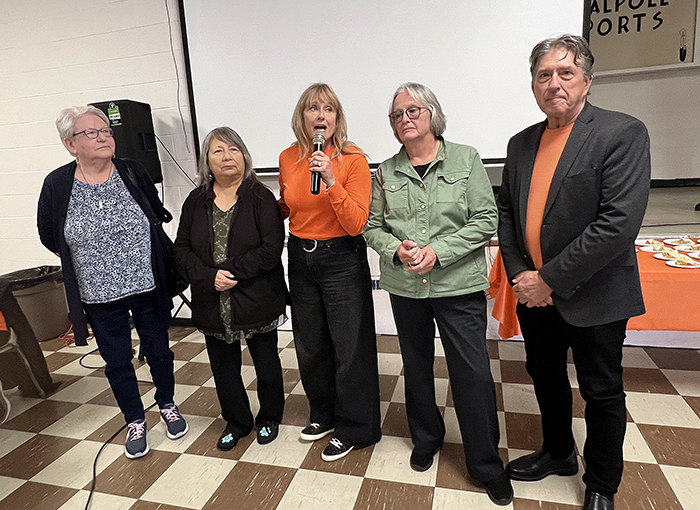
A story of fear, courage, trauma, resiliency, innocence lost and indomitable human spirit poured forth at the celebration of life for Enos (Bud) Whiteye April 27 at the Walpole Island Community Centre.
Whiteye, an elder of Bkejwanong First Nation, overcame years of abuse at the Mohawk Institute Indian Residential School in Brantford to become a United States Marine Corps veteran, a university graduate, a noted journalist and author, and a determined voice in raising awareness about the horrors of Canadian residential schools.
Cancer claimed him on Feb. 1 at the age of 79, but his words and story were on display during the celebration, as those in attendance viewed “The Nature of Healing: Surviving the Mohawk Institute,” in which Bud was interviewed. Copies of his 2004 book “A Dark Legacy – A Primer on Indian Residential Schools in Canada” were also distributed to the dozens of attendees.
Kristen Noble, Bud’s oldest of nine children, said her father was nine years old when he and four siblings were taken from his home in Moraviantown by a white man and woman in a black car and promised ice cream. He fell asleep, and when he awakened, he didn’t know where he was.
In “A Dark Legacy,” Bud wrote that once at the school, he was taken to the school’s basement, ostensibly to look at the boiler. The man who took him began to straighten his shirt and tuck in his pants, which led to fondling and eventually to years of sexual molestation.
Children were told not to try to escape because their parents had sent them to the school, and no one would help them.
After several years, Bud was able to leave and return home. He joined the U.S. Marine Corps for four years, following the lead of other family members.
He served in Vietnam in the mid 1960s and led his platoon at different times when senior officers were killed. Despite its horrors, Kristen said her father told her, “Fighting the war was easier than being in the residential school.”
Following his military service, Bud attended Western University, graduating with a degree in journalism.
He became a columnist for The Chatham Daily News, which syndicated his material across the Osprey News Network to newspapers across the province.
He won an Ontario Newspaper Award (ONA) in 2005 and was named ONA’s Journalist of the Year in 2010.
Bruce Corcoran, Daily News manager editor at the time and current Chatham Voice co-owner, said, “we had an amazing array of talent in our newsroom and won many awards but I don’t think I was ever prouder than I was when Bud won his awards. He was ahead of his time in telling people what had happened in residential schools.”
The trauma of the Mohawk Institute stayed with Bud throughout his life. He battled substance abuse and depression, Kristen said.
Sobriety refocused his desire to ensure that the experiences he endured would not be repeated.
“He didn’t want any other generation to deal with the pain,” Kristen said. “When he wrote his book, he didn’t want his children to read it because it was so dark, but he knew that sharing his story might help others to understand.”






